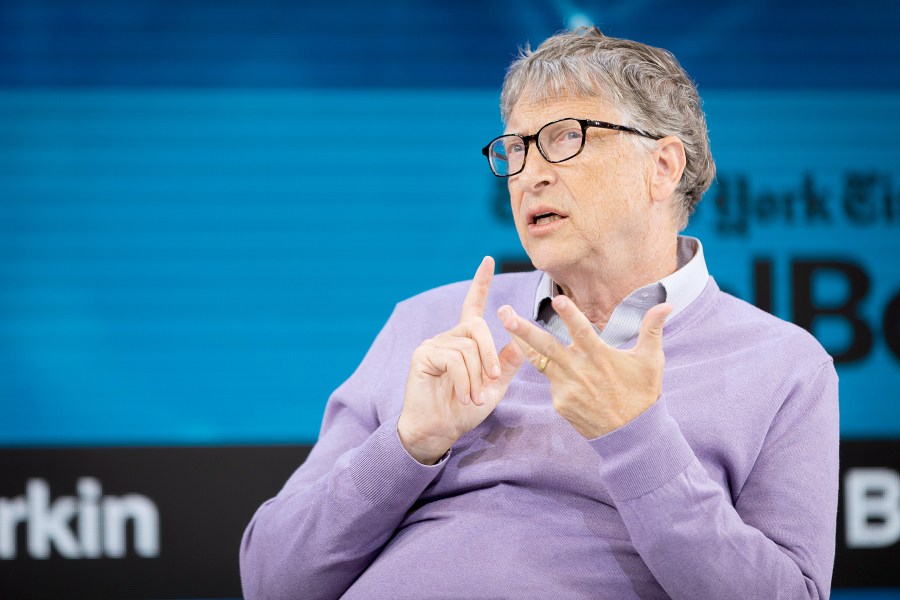America is lagging on climate change. Where is our innovative spirit?

This week alone in our changed climate: More than two dozen people have died in wildfires in Western states and more are missing. Forecasters predict life-threatening flooding from Hurricane Sally in the Gulf. And the foundations of two major Antarctic glaciers are crumbling, threatening dramatic sea level rise.
The Trump administration, including the president, disputes that climate change exists. Bill Gates is founder of the billion-dollar Breakthrough Energy Ventures investment fund. He says American innovation is still necessary if we’re going to meet U.N. goals of becoming carbon neutral by 2050.
“The U.S. is critical because so much of the innovation power in the globe is in the United States: the universities, the national labs, the risk capital formation,” he said. “So, to invent new ways of making steel and cement, or clean hydrogen aviation fuels with no emissions, without the U.S. scientific capability engaged and seeing that as a future market and good for the planet, we won’t hit the 2050 deadline for this.”
The full transcript of the “Marketplace Tech” interview with Bill Gates is available here. Tomorrow, he’ll talk with Molly Wood about whose job it really is to solve the world’s biggest problems.
Related links: More insight from Molly Wood
It was, despite my comments about the tech industry, not a bad week in tech and climate. Google announced a really ambitious climate goal: to run its entire operations on carbon-free energy by 2030. The company also said it’s bought enough carbon offsets and invested in enough renewable energy to basically cancel all its carbon emissions since 1998.
Now, that was still a lot of carbon emissions. The Verge reports Google’s various office buildings and server farms and data centers released the equivalent of more than a million passenger cars worth of greenhouse gases in 2018 alone. But Google says it hopes its transition to 100% renewable energy will encourage other companies to do the same. More importantly, if a company the size of Google becomes a major buyer of clean energy technology and pushes the industry to create better battery tech, say for storing solar and wind power or more efficient grid infrastructure, it helps create the commercial demand that Gates and I spoke about. So, actually, that’s great news.
Facebook also has been pushed into more climate action, which is great since they wouldn’t even talk to us last year when we asked what the tech industry was doing to help innovate on climate change. The company this week announced that it would offset all of its carbon emissions this year as well and try to reach net-zero emissions for its entire supply chain by 2030. That’s not the same thing as being 100% powered by renewable energy, to be clear. It means there will be a combination of reduced fossil fuel use, combined with investment in carbon removal like planting trees or actually removing carbon from the air using a whole bunch of emerging technology.
Facebook’s move could potentially accelerate that ecosystem, which is good. I do want to point out that the country of Norway also plans to be net carbon zero by 2030. I actually wouldn’t mind seeing a comparison of the energy use between Facebook and Norway. But that’s a tangent.
Facebook also announced a new climate information center to connect people with facts about climate change. But TechCrunch points out the company does not aggressively take down or label climate disinformation. And presumably as long as we continue to consider climate denial to be a legitimate political stance, instead of, well, disinformation, that policy isn’t likely to change much.
The future of this podcast starts with you.
Every day, the “Marketplace Tech” team demystifies the digital economy with stories that explore more than just Big Tech. We’re committed to covering topics that matter to you and the world around us, diving deep into how technology intersects with climate change, inequity, and disinformation.
As part of a nonprofit newsroom, we’re counting on listeners like you to keep this public service paywall-free and available to all.
Support “Marketplace Tech” in any amount today and become a partner in our mission.

















